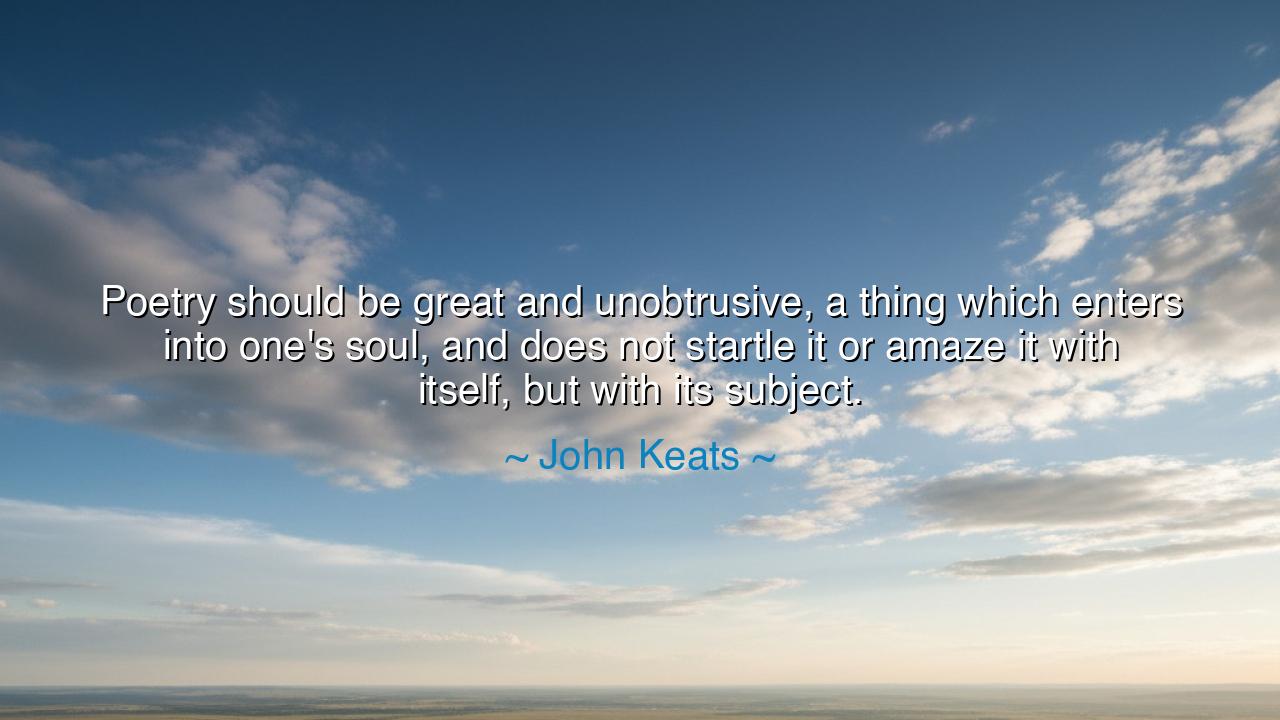
Poetry should be great and unobtrusive, a thing which enters
Poetry should be great and unobtrusive, a thing which enters into one's soul, and does not startle it or amaze it with itself, but with its subject.






Hear, O lovers of beauty and truth, the words of John Keats, who proclaimed: “Poetry should be great and unobtrusive, a thing which enters into one’s soul, and does not startle it or amaze it with itself, but with its subject.” In this saying, Keats, the great voice of the Romantic age, reveals his vision of art: that poetry should not parade its own brilliance, nor dazzle the reader with empty display, but should move quietly, like a river flowing into the heart, awakening awe not for the poet but for the truth the poem reveals.
For what is poetry, if it shines only for its own sake? It becomes a glittering mask, admired for its surface yet hollow within. Keats rejects such vanity. He insists that true greatness lies in unobtrusiveness, in the art so well crafted it disappears into its own subject. The reader should not say, “How clever is the poet,” but rather, “How wondrous is the world he shows me.” The poet is but a window; the vision beyond is what matters.
This vision arose from Keats’s own struggle with the traditions before him. He lived in the shadow of Shakespeare and Milton, giants whose verse sometimes thundered with their own majesty. Keats sought another path. He longed for poetry that entered the reader like fragrance, gentle yet unforgettable, awakening a sense of beauty beyond the poet’s hand. In his own work—such as “Ode to a Nightingale” or “Ode on a Grecian Urn”—he achieved this. The words vanish, and what remains is the bird’s song, the urn’s silence, the eternal mystery of beauty.
Consider the story of Fra Angelico, the Renaissance painter who, it is said, prayed before every brushstroke and wished his art to point only toward the divine. His frescoes do not boast of the painter’s skill, though the skill is immense; they invite the viewer into contemplation of the sacred. So too with Keats’s vision: the art is the vessel, the subject is the flame. The vessel should not blind the eye, but carry the flame safely into the soul.
This truth speaks also to the danger of art in every age. Too often, artists and poets fall into the temptation of astonishment—seeking to impress, to dazzle, to shock. Such works may stir briefly, but they fade, for they draw attention not to the eternal subject but to the fleeting self of the artist. Keats warns us that lasting poetry is not about the ego, but about the revelation of beauty, truth, and meaning.
Yet let us not mistake unobtrusive for weak. Poetry must be great, Keats insists—profound, powerful, eternal in its resonance. But its greatness is not in shouting, it is in whispering deeply enough to reach the marrow of the soul. Like the rising of dawn, it does not amaze us with the sun itself, but with the light it sheds upon the world.
Therefore, O seekers, take this lesson: in your own work and in your own lives, strive not for attention, but for truth. Let your words, your deeds, your art be like poetry—quiet in form, yet great in substance. Seek not to amaze others with yourself, but with the subject you serve: justice, love, beauty, truth. In this way, you will not merely impress minds for a moment, but enter into souls for eternity.
And so remember Keats’s wisdom: poetry is not a trumpet blast to glorify the poet, but a gentle flame to illuminate the subject. Let your art, your speech, your living, be unobtrusive yet great—so that those who encounter you do not marvel at you, but at the truth you have revealed. This is the path of greatness that endures.






HHiep
I find this quote calming, almost like advice to both writers and readers. It invites poetry to be a bridge, not a barrier—a way to encounter beauty without distraction. But I wonder if today’s readers still crave that kind of quiet revelation. Have we lost the patience for poetry that whispers instead of shouts? Or do we need it now more than ever?
HDHang Duong
There’s a beautiful modesty in this view of poetry. Keats seems to suggest that the poet should be invisible, letting the subject shine. But is that realistic? Don’t all poets, even unconsciously, reveal themselves through their art? Maybe he meant that the ego should step aside, not disappear completely. I’d love to know how he practiced this ideal in his own writing.
HQPham Hong Quang
This idea reminds me of how music works—the best melodies don’t scream; they linger. I think Keats was speaking to the timeless power of gentleness in art. Poetry that seeps quietly into the heart might last longer than what dazzles for a moment. But I’m curious—how does a poet achieve that balance between restraint and resonance without losing emotional power?
TTNguyen Tuan Tu
Keats’s statement makes me question what makes a poem truly great. Is it subtlety—the ability to move without demanding attention? Or is it intensity, the kind that stirs emotion instantly? I admire his belief in unobtrusive greatness, but part of me wonders if some of the most memorable poetry *does* startle us, precisely because of its boldness. Can both approaches coexist?
PLPhuong Linh
This perspective feels almost spiritual to me. Keats seems to believe that poetry should dissolve into experience, becoming invisible as it reveals truth. I wonder how that contrasts with today’s performance-driven culture, where poems often seek to impress or shock. Can quiet beauty still compete in a world that rewards noise and spectacle?